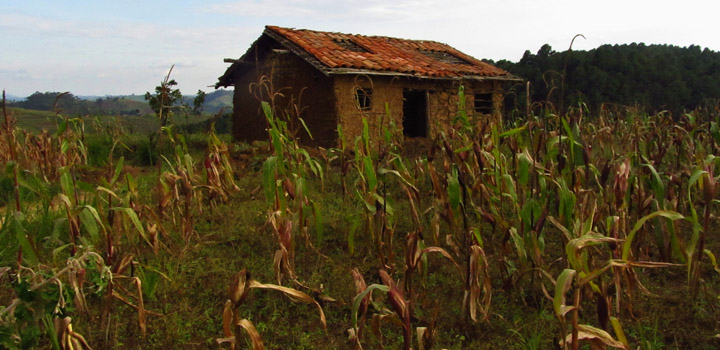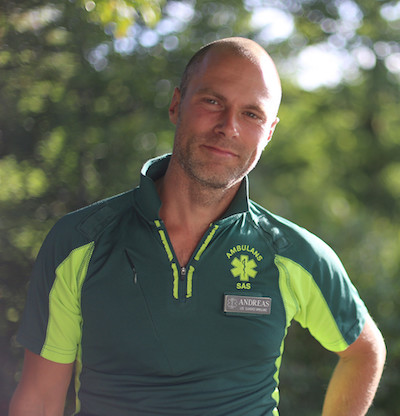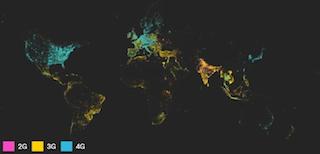sub-Saharan Africa
See the following -
'Virtual Doctors' Helping Patients in Zambia
The idea of a "virtual doctor" project might sound rather futuristic. But the inspiration for this scheme to improve health services in Zambia began in very low-tech and unhappy circumstances. Huw Jones, working in Zambia as a safari guide, was driving a Land Rover along a road in a remote part of the country. He saw a trail of blood in the road, and his first reaction was that it might have come from an animal killed by a lion. But he came across a couple on a bike - the man riding and the woman carried on the handlebars. She was pregnant and bleeding heavily and they had been cycling for hours with the aim of reaching the nearest hospital, almost 60 miles away...
- Login to post comments
Africa’s Tech Edge
How the continent's many obstacles, from widespread poverty to failed states, allowed African entrepreneurs to beat the West at reinventing money for the mobile age
- Login to post comments
Agricultural Policies in Africa Could Be Harming the Poorest
 Published this month in the journal World Development, the study finds that so-called ‘green revolution’ policies in Rwanda - claimed by the government, international donors and organisations such as the International Monetary Fund to be successful for the economy and in alleviating poverty - may be having very negative impacts on the poorest. One of the major strategies to reduce poverty in sub-Saharan Africa is through policies to increase and modernise agricultural production...
Published this month in the journal World Development, the study finds that so-called ‘green revolution’ policies in Rwanda - claimed by the government, international donors and organisations such as the International Monetary Fund to be successful for the economy and in alleviating poverty - may be having very negative impacts on the poorest. One of the major strategies to reduce poverty in sub-Saharan Africa is through policies to increase and modernise agricultural production...
- Login to post comments
Condom Airborne Meds: 6 Ways Drones Could Change Health Care
 Drones have been used to deliver sunscreen to a conference in Palm Springs, Calif., and pizza to a family in New Zealand, but they’re also in the air for far more urgent purposes — such as saving lives. In fact, in some cases, drones could carry defibrillators to heart attack victims faster than an ambulance, according to a paper published Tuesday in the Journal of the American Medical Association. Researchers simulated emergency situations and found they could get automatic external defibrillators to the scene an average of 16 minutes faster by drone than by ambulance...
Drones have been used to deliver sunscreen to a conference in Palm Springs, Calif., and pizza to a family in New Zealand, but they’re also in the air for far more urgent purposes — such as saving lives. In fact, in some cases, drones could carry defibrillators to heart attack victims faster than an ambulance, according to a paper published Tuesday in the Journal of the American Medical Association. Researchers simulated emergency situations and found they could get automatic external defibrillators to the scene an average of 16 minutes faster by drone than by ambulance...
- Login to post comments
Developing Nations Improving Health Communication Through the Use of DHIS2 (Part 1)
 DHIS2 implementations are spreading steadily among national health services in developing countries as well as among international non-governmental organizations (NGOs) working to improving health in the developing world through the use of health information technology. As an open source solution, DHIS2 offers developing countries the advantage of adopting a cost-effective and flexible solution for aggregate statistical data collection, validation, analysis, management, and presentation as well as for data sharing between healthcare professionals and facilities. Organizations and individuals who work with humanitarian software solutions will need to know what DHIS2 is, how it works, and how it might be implemented by national health services and other health-related projects across the globe...
DHIS2 implementations are spreading steadily among national health services in developing countries as well as among international non-governmental organizations (NGOs) working to improving health in the developing world through the use of health information technology. As an open source solution, DHIS2 offers developing countries the advantage of adopting a cost-effective and flexible solution for aggregate statistical data collection, validation, analysis, management, and presentation as well as for data sharing between healthcare professionals and facilities. Organizations and individuals who work with humanitarian software solutions will need to know what DHIS2 is, how it works, and how it might be implemented by national health services and other health-related projects across the globe...
- Login to post comments
Digitizing Maps Of Malaria Hotspots To Save Lives
Mapping collaboration between Europe and Africa has led to the creation of a digitized malaria mapping database that for the first time brings together all available malaria data, helping tackle a disease that kills more than 660,000 people every year.
- Login to post comments
District Health Information System 2 (DHIS2)
 District Health Information Software 2 (DHIS2) is a free and open source health management data platform used by multiple organizations, including the European Union (EU), and governments worldwide. It is currently being deployed in 54 countries. DHIS2 is a development project by the Health Information Systems Program (HISP) and is used for aggregate statistical data collection, validation, analysis, management, and presentation...
District Health Information Software 2 (DHIS2) is a free and open source health management data platform used by multiple organizations, including the European Union (EU), and governments worldwide. It is currently being deployed in 54 countries. DHIS2 is a development project by the Health Information Systems Program (HISP) and is used for aggregate statistical data collection, validation, analysis, management, and presentation...
- Login to post comments
Joining Up Ghana's Healthcare To Save Lives
[Giving birth] kills more mothers and babies than anywhere else in the world, according to the World Health Organisation (WHO)...In Ghana, for example, the Maternal Mortality Rate (MMR) declined by 49% between 1990 and 2013 to 380 deaths per 100,000 live births in 2013 - but this still leaves some way to go to reach the United Nations Millennium Development Goal of 185...
- Login to post comments
Rethink the School of Tomorrow: Africa as the Starting Hypothesis
With 200 million inhabitants between the ages of 15 and 24, Africa is today the youngest continent on the planet. These young Africans will be the future leaders and the driving force of the continent’s economic, social and cultural development. A well-functioning inclusive educational system is thus essential to tackle tomorrow’s challenges. For several years, governments and large institutions on the planet, have attempted to implement an educational system relevant to the continent’s challenges. Considerable efforts have been made to catch up on an accumulated backlog in this crucial sector, allowing to tremendously enhance access to primary education...
- Login to post comments
The Disaster Response Innovation Fund Is Open for Applications
 Since the inception of GSMA’s Disaster Response programme in 2012, we have worked with our GSMA members, humanitarian partners and the wider private and humanitarian sectors to drive the creation and adoption of coordinated, impactful solutions and practices that leverage the ubiquity of the mobile technology. Since 2015 we have done this under the umbrella of the Humanitarian Connectivity Charter, a global initiative which now has over 115 Mobile Network Operator (MNO) signatories across 78 countries...
Since the inception of GSMA’s Disaster Response programme in 2012, we have worked with our GSMA members, humanitarian partners and the wider private and humanitarian sectors to drive the creation and adoption of coordinated, impactful solutions and practices that leverage the ubiquity of the mobile technology. Since 2015 we have done this under the umbrella of the Humanitarian Connectivity Charter, a global initiative which now has over 115 Mobile Network Operator (MNO) signatories across 78 countries...
- Login to post comments
The Four Big Reasons Why 4 Billion People Aren't Online
 It's around 46 years since consumers first started to use online services, and 23 years since the NCSA Mosaic browser started to popularise the World-Wide Web. But more than half the world's population - around 4.1 billion people - are still not using the Internet, according to Facebook's 56-page State of Connectivity 2015 report. The authors note that "Over the past 10 years, connectivity increased by approximately 200 to 300 million people per year."...
It's around 46 years since consumers first started to use online services, and 23 years since the NCSA Mosaic browser started to popularise the World-Wide Web. But more than half the world's population - around 4.1 billion people - are still not using the Internet, according to Facebook's 56-page State of Connectivity 2015 report. The authors note that "Over the past 10 years, connectivity increased by approximately 200 to 300 million people per year."...
- Login to post comments
VirusDetect, a New Bioinformatics Pipeline for Virus Identification Released
 Researchers studying the viruses that affect agricultural production or human health now have a new tool for investigating where viruses have spread, on a local, national, or even global scale. VirusDetect is a free, open-source bioinformatics pipeline that can efficiently analyze small RNA (sRNA) datasets to identify both known and novel viruses. Boyce Thompson Institute (BTI) Associate Professor Zhangjun Fei and colleagues present this pipeline in a recent paper in Virology...
Researchers studying the viruses that affect agricultural production or human health now have a new tool for investigating where viruses have spread, on a local, national, or even global scale. VirusDetect is a free, open-source bioinformatics pipeline that can efficiently analyze small RNA (sRNA) datasets to identify both known and novel viruses. Boyce Thompson Institute (BTI) Associate Professor Zhangjun Fei and colleagues present this pipeline in a recent paper in Virology...
- Login to post comments
VirusDetect, a New Open Source Bioinformatics Pipeline for Virus Identification Released
 Researchers studying the viruses that affect agricultural production or human health now have a new tool for investigating where viruses have spread, on a local, national, or even global scale. VirusDetect is a free, open-source bioinformatics pipeline that can efficiently analyze small RNA (sRNA) datasets to identify both known and novel viruses. Boyce Thompson Institute (BTI) Associate Professor Zhangjun Fei and colleagues present this pipeline in a recent paper in Virology...
Researchers studying the viruses that affect agricultural production or human health now have a new tool for investigating where viruses have spread, on a local, national, or even global scale. VirusDetect is a free, open-source bioinformatics pipeline that can efficiently analyze small RNA (sRNA) datasets to identify both known and novel viruses. Boyce Thompson Institute (BTI) Associate Professor Zhangjun Fei and colleagues present this pipeline in a recent paper in Virology...
- Login to post comments
West Africa: Five Questions - Lesley-Anne Long, mPowering Frontline Health Workers
 Lesley-Anne Long is the global director at mPowering Frontline Health Workers, a public-private partnership that uses mobile technologies to strengthen health systems and end preventable child and maternal deaths. She spoke with us about lessons learned from the Ebola outbreak. ...
Lesley-Anne Long is the global director at mPowering Frontline Health Workers, a public-private partnership that uses mobile technologies to strengthen health systems and end preventable child and maternal deaths. She spoke with us about lessons learned from the Ebola outbreak. ...
- Login to post comments
Why African Countries Need to Invest in Research and Citizen Science
 Climate change, HIV/AIDS, recurring droughts, and food insecurity are some of the most pressing issues the African continent has had to deal with in 2016. These issues pose a significant threat to economic, social and environmental development in Africa and create health and economic challenges to the continent. Yet, all of these challenges can benefit from research results spinning off from African universities and research institutions. But to get these results, the institutions must have the funds...
Climate change, HIV/AIDS, recurring droughts, and food insecurity are some of the most pressing issues the African continent has had to deal with in 2016. These issues pose a significant threat to economic, social and environmental development in Africa and create health and economic challenges to the continent. Yet, all of these challenges can benefit from research results spinning off from African universities and research institutions. But to get these results, the institutions must have the funds...
- Login to post comments